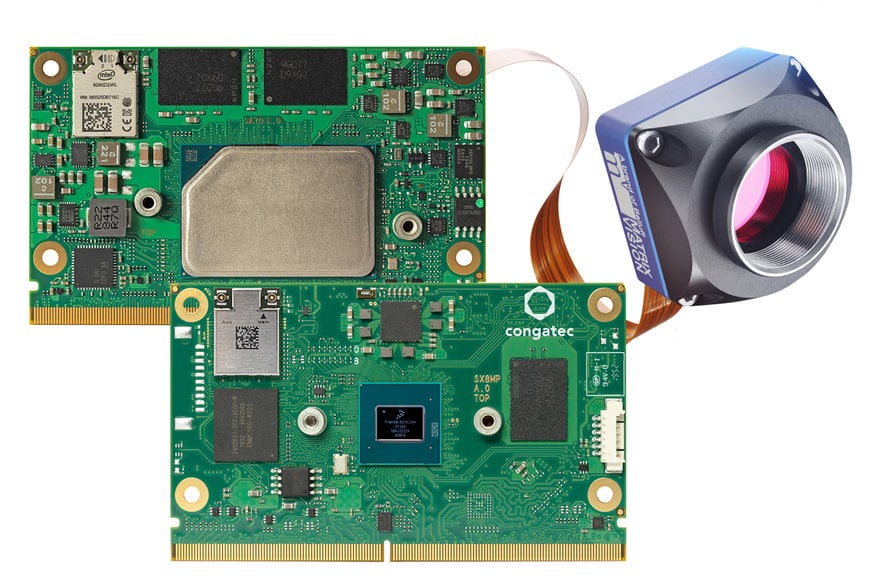electronics-journal.com
08
'21
Written on Modified on
Virtually latency free vision with up to 226.5 FPS
congatec and MATRIX VISION present PCIe based high-speed vision technology. congatec and MATRIX VISION will showcase their new SMARC Computer-on-Module platform with PCI Express (PCIe) based camera module extension for the first time at Vision in Stuttgart.

With no overhead and no need for additional interfaces such as GbE, USB or MIPI CSI, image data are written directly into the RAM of the SMARC module with virtually no latency and higher bandwidth [1]. MATRIX VISION’s Sony Pregius sensor based camera modules deliver image data to congatec’s Intel Atom processor based SMARC module at speeds of up to 226.5 frames per second (FPS) and with 1.6 megapixel resolution. Such high-speed transmission enables hard real-time at clock rates of approximately 4 milliseconds.
This clocking is also a great fit for actuator commands over TSN (Time Sensitive Networking) based Ethernet, which provides hard real-time at clock rates <1 millisecond. Typical use cases are found in industrial machine vision applications in electronics and semiconductor manufacturing, the automotive industry, food and beverage, pharmaceuticals, packaging and printing. Other markets include healthcare, intelligent transportation systems (ITS), as well as airport security and surveillance systems.
“PCIe based camera implementations are predestined for ultra-low-latency, high-speed, real-time vision applications. One reason is that – unlike GbE, USB or MIPI – there is no overhead in the protocol. Secondly, the interface is always natively supported by the processor, which is not always the case with GbE, USB or MIPI,” explains Martin Danzer, Director Product Management at congatec.
“The ability to use multiple lanes in parallel makes PCIe performance highly scalable across multi-camera system solutions while keeping overall system costs low. PCIe also offers high investment security into the future as this bus is inextricably linked to the x86 processor bus,” explains Uwe Hagmaier, Head of R&D at MATRIX VISION.
The live demo, which can operate with up to four camera modules, is designed for SMARC modules with Intel Atom, Intel Pentium and Intel Celeron processors (code names Elkhart Lake and Apollo Lake). Variants featuring NXP i.MX8 M Plus processor based SMARC modules are also available. The MATRIX VISION mvBlueNAOS camera module family uses the latest global shutter sensors from the Sony Pregius and Pregius S series. Providing high image quality, small pixel sizes and high transfer rates, they are a perfect fit for this camera platform. To support the various processor architectures available on SMARC, a mvIMPACT Acquire SDK is part of the package. The GenICam GenTL producer ensures compatibility with existing developments and guarantees a smooth switch between different hardware platforms. Additional packages for LabVIEW, DirectShow, VisionPro and Halcon are also available.
Developers interested in evaluating the PCIe vision cards of the mvBlueNAOS family in combination with congatec SMARC modules based on Intel Atom, Intel Pentium and Intel Celeron processors as well as NXP i.MX8 M Plus processors, can choose between 6 different camera models with resolutions ranging from 1.6 MP (1456 x 1088) to 24.6 MP (5328 x 4608) and frame rates from 226.5 to 24.1 FPS.
For more information about SMARC Computer-on-Modules from congatec, visit:
https://www.congatec.com/en/technologies/smarc/
For more information about camera modules from MATRIX VISION, visit:
https://www.matrix-vision.com/pci-express-camera-module-series-mvbluenaos2-en.html
www.congatec.com

